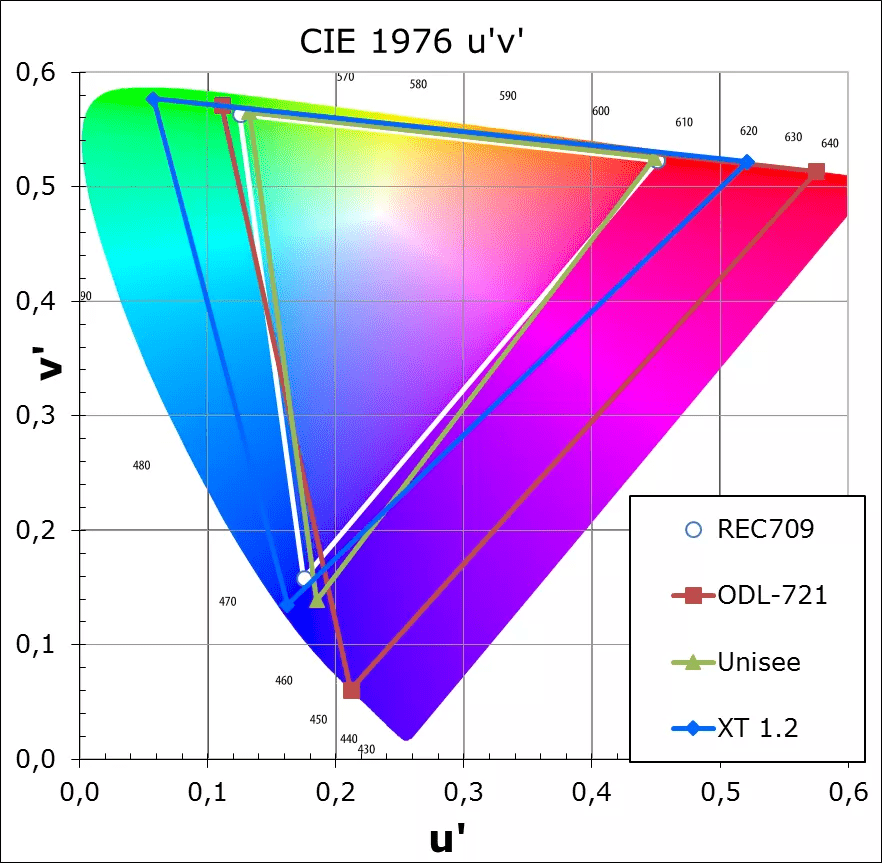Talking about colors
3분 읽기
Regardless of the application, perfect colors are vital for the success of your video wall. Whether it’s a corporate presentation, live security footage, or, why not, a weather forecast - high-quality colors ensure your content comes to life the way you want it to. So what do you need to know when talking about the color capabilities of a video wall? Here’s three things to start with.
Do you know the color gamut of your display?

The term gamut was adopted from the field of music, where it means the set of pitches of which musical melodies are composed.
In the visualization industry, it is used to indicate how accurately a device can reproduce a certain range of colors from the entire color spectrum. The chromaticity diagram represents all the colors that can be perceived by the human eye. The most used way to represent color accuracy is by comparing color gamut triangles on the chromaticity diagram. The bigger the area that is covered by the triangle, the better the visualization device is at (re-)producing colors.
Rec. 2020 is currently the widest color space available. But not all applications need such broad color capabilities. Today, Rec 709. is the most common color space for most projects. Per example, the attached graph shows the color gamut triangles of 3 different Barco technologies.
What is the importance of adjusting your display’s white point?
If you look at a white piece of paper it will be colored by the light source that shines on it. Hence, it will look different when you look at it under sunlight conditions, than under artificial light in your office. The same goes for displays and video walls. The white point spec of your display tells you how white the color white looks on your device. For an extensive explanation of white points in displays, we’d like to refer to this article.
Depending on the destination of your video wall, you can play with its white point settings. In control rooms, for example, you can change the video wall’s white point diminishing the amount of blue colors to prevent eye strain. You could compare it to the night mode on our smartphone displays.
Barco’s visualization and processing solutions also allow for custom white point adjustments. With our unique Sense X automatic color and brightness calibration system, you can freely select the white point to any color temperature between 3200K and 11000K. This system is available on Barco’s rear-projection video walls (both LED-lit and LASER-lit) and LCD video walls. And our LED walls too feature the flexibility to precisely select the mood of the image you want.
How can image processing affect color performance?
Your video wall may be peaking in color capabilities, but the wrong processing or color adjustment will still ruin the quality of your image.
The dimming mechanisms of most LED products, for instance, reduce the dynamic range of the colors. The images lose grey scale levels. The details on the blacks disappear or the grey scale image suddenly starts to show a strange color effect or green haze. Thanks to Barco’s proprietary LED processing platform, Infinipix, image quality is perfect in both dimmed and high-brightness mode. The optimized smooth dimming technology takes special care of the colors and grayscales – allowing you to adjust and fine-tune the brightness as you like by selecting a value between 1 and 100% – without any loss of color quality or image details. Want to know more about LED processing? Check our LED Talks blog series.
Conclusion
For video walls in all applications it is most important to show colors with utmost accuracy to ensure the displayed image matches the native intended image. In television studios, color accuracy highlights the professionalism of your productions. In control rooms, perfect color performance is key in being able to make the right decisions. Throughout the years, technology has developed, and visualization solutions are growing in their color capabilities. With Barco’s visualization and processing portfolio, you can be sure of outstanding viewing experiences under all conditions with unmatched color accuracy.

